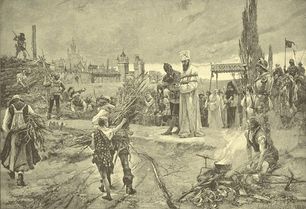John Wycliffe and Jan Hus

In the late 1300s, John Wycliffe, a scholar at Oxford University in England, questioned the authority of Church teachings. Wycliffe felt that Church corruption limited the ability of the clergy to properly lead Christians towards salvation. In addition, he questioned Church teachings and eventually proclaimed that a person did not need the Church and its sacraments to attain salvation. Wycliffe said that Christians should regard the Bible, not the Church, as the supreme source of religious authority. So that common people in England could read the Bible, Wycliffe and his followers, called Lollards, completed the first translation of the Bible into English. Wycliffe was expelled from Oxford in 1382 for his reformist views, and the Church continued to persecute Lollards as heretics, but Wycliffe's ideas spread across Europe and influenced other reformers.
Jan Hus was influenced by the ideas of John Wycliffe to lead a reform movement in his native Bohemia, located in what is today the Czech Republic. In the late fourteenth century, Hus was the rector of Prague University, a position from which he challenged the pope's authority and criticized the wealth of the Church. Hus agreed with Wycliffe that the pope and Church officials held absolute authority only when their views reflected the life of Christ and the scriptures. In order for common people be able to worship God without the potentially corrupt influence of the Church, Hus supported, instead of Latin, the use of vernacular languages in religious practices. For example, he wanted Mass said in Czech and to have Bibles translated into the people's language. Hus also spoke out against the selling of indulgences and important Church offices, which he felt were practices used only to raise money.
Due to his calls for reform, Hus was summoned to appear before the Council of Constance, a convocation of Church officials who met in 1415 to solve the Great Schism and other religious questions. The Council chose to defend the Church's position of unquestioned authority by silencing reformers. Thus, Hus was charged with heresy. In his defense, he claimed that Christians should seek God not in sacraments and rituals, but in Scripture. Because these views were deemed to be against the teachings of the Church, the Council had Hus burned at the stake. The spirit of his challenge, however, remained strong and spread out from Bohemia.
Jan Hus was influenced by the ideas of John Wycliffe to lead a reform movement in his native Bohemia, located in what is today the Czech Republic. In the late fourteenth century, Hus was the rector of Prague University, a position from which he challenged the pope's authority and criticized the wealth of the Church. Hus agreed with Wycliffe that the pope and Church officials held absolute authority only when their views reflected the life of Christ and the scriptures. In order for common people be able to worship God without the potentially corrupt influence of the Church, Hus supported, instead of Latin, the use of vernacular languages in religious practices. For example, he wanted Mass said in Czech and to have Bibles translated into the people's language. Hus also spoke out against the selling of indulgences and important Church offices, which he felt were practices used only to raise money.
Due to his calls for reform, Hus was summoned to appear before the Council of Constance, a convocation of Church officials who met in 1415 to solve the Great Schism and other religious questions. The Council chose to defend the Church's position of unquestioned authority by silencing reformers. Thus, Hus was charged with heresy. In his defense, he claimed that Christians should seek God not in sacraments and rituals, but in Scripture. Because these views were deemed to be against the teachings of the Church, the Council had Hus burned at the stake. The spirit of his challenge, however, remained strong and spread out from Bohemia.
